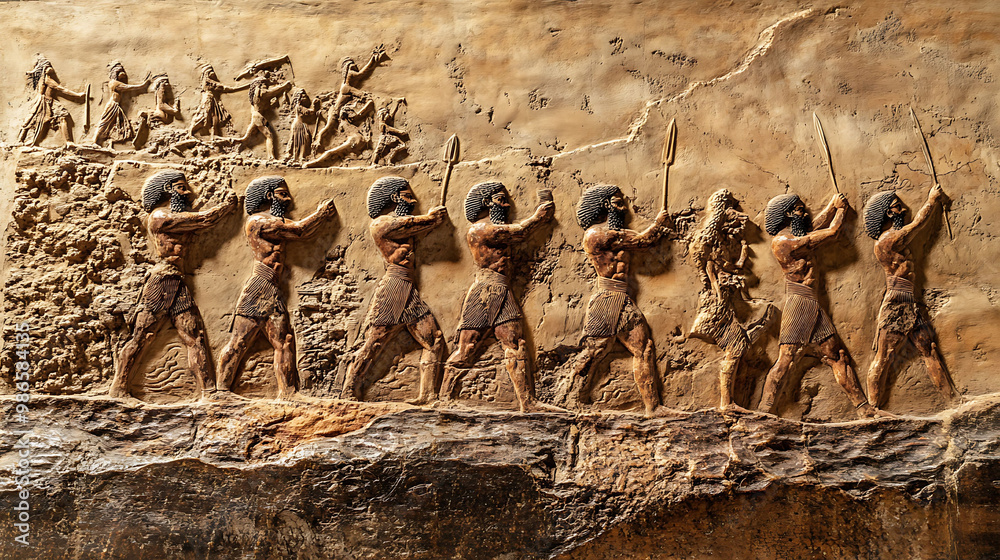
The Mesopotamian Flood:
Myths That Shaped Early Civilization
Table of Contents
Introduction to Mesopotamian Civilization
Mesopotamia, often referred to as the “cradle of civilization,” is renowned for its rich history and contributions to human development. Located between the Tigris and Euphrates rivers, this region was pivotal in the emergence of urban societies, writing, and complex governance. The myths that arose from this area played a fundamental role in shaping the cultural and societal norms of its people, acting as both explanations for natural phenomena and reflections of the human condition.
The Geographic Context of the Mesopotamian Flood
The Tigris and Euphrates rivers, which flow through modern-day Iraq, were the lifeblood of Mesopotamian civilization. They provided essential water resources for agriculture, enabling the growth of crops that supported large populations. However, these rivers were also prone to flooding, which could devastate settlements and agricultural land.
Natural disasters such as floods were common in ancient Mesopotamia. These catastrophic events significantly impacted agriculture and settlement patterns, leading to both destruction and opportunities for renewal, thus finding their way into the mythology of the time.
Key Myths Surrounding the Flood
Two of the most significant narratives surrounding the flood in Mesopotamian mythology are found in the Epic of Gilgamesh and the Atrahasis Epic.
- Epic of Gilgamesh: This ancient text features a flood story where Utnapishtim, a character akin to Noah, is instructed by the god Ea to build a boat to survive a divine flood meant to annihilate humanity. This narrative emphasizes themes of mortality and the quest for immortality
Atrahasis Epic: This myth describes how the gods created humanity and later decided to flood the earth to reduce the human population, which had become too noisy. Atrahasis, the protagonist, builds a vessel to save himself and animals, echoing the Utnapishtim story
Symbolism of the Flood in Mesopotamian Myths
The flood serves as a powerful symbol in Mesopotamian mythology, representing divine judgment and the potential for renewal. It illustrates a complex relationship between humans and deities, where the gods exert control over humanity’s fate.
- Divine Judgment: Flood narratives often depict the gods’ displeasure with humanity, leading to catastrophic floods as a form of punishment.
Renewal: Despite the destruction, the flood also symbolizes a fresh start, allowing for the rebirth of civilization.
Archaeological findings and ancient artifacts provide insights into the flood myths of Mesopotamia. Cuneiform tablets that contain references to these stories have been unearthed, alongside seals and inscriptions that depict flood scenes.
Geological studies have also supported the existence of significant flood events in the region, suggesting that these myths may be rooted in real historical occurrences that shaped the landscape and memory of the people.
Cultural Impact of Flood Myths on Mesopotamian Society
The flood myths in Mesopotamia influenced various aspects of society, including law, governance, and morality. These narratives served as frameworks for understanding justice, community responsibility, and the relationship between humans and the divine. They were tools for explaining natural phenomena, helping people navigate the challenges presented by their environment.
Comparative Analysis with Other Flood Myths
Flood myths are not unique to Mesopotamia and can be found in numerous cultures worldwide. A notable comparison is with the Biblical story of Noah’s Ark:
- Similarities: Both narratives feature a chosen figure who builds an ark to survive a divine flood, preserving life.
Differences: The motivations behind the floods differ, with Mesopotamian myths often emphasizing human noise and overpopulation, while the Biblical narrative focuses on human wickedness.
The Legacy of Mesopotamian Flood Myths in Literature and Art
The enduring influence of Mesopotamian flood myths can be seen in later literary works and artistic representations. These narratives have inspired writers, poets, and artists throughout history, appearing in various forms, from classical literature to modern adaptations.
- Literature: Many authors draw upon the themes of flood myths to explore human resilience and the struggle against nature.
Art: Artistic depictions of floods can be found in ancient artifacts, as well as contemporary artwork that reflects on the themes of destruction and rebirth.
Today, ancient flood myths resonate with contemporary society, particularly in discussions about climate change and environmental ethics. The narratives reflect humanity’s ongoing struggle with nature, prompting reflections on environmental stewardship and the impact of human activity on the planet.
Moreover, these myths serve as reminders of the potential consequences of ignoring the balance between human endeavors and the natural world.
Conclusion: The Enduring Power of Mythology in Shaping Civilization
Understanding Mesopotamian flood myths provides valuable insights into the historical context of early civilization. These narratives not only shaped the cultural identity of Mesopotamia but continue to influence modern thought and artistic expression.
The legacy of these myths underscores the importance of mythology in understanding human culture, identity, and the relationship with the environment.
https://mythologyworldwide.com/the-meso ... ilization/




















